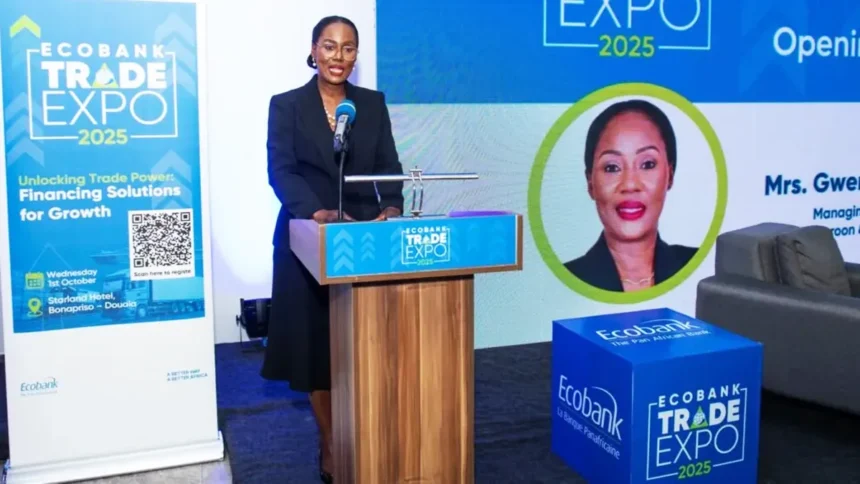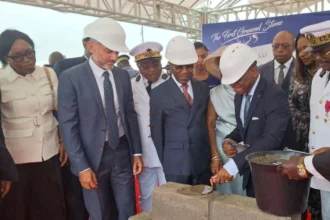According to the African Development Bank (AfDB), Africa faces an annual trade finance gap of $120 billion. In a global economy where nearly 90% of trade relies on trade finance mechanisms, this gap constitutes a significant bottleneck for the continent. Small and medium-sized enterprises (SMEs), the backbone of Africa’s economies, are often the most affected, lacking access to affordable credit and international financial instruments.
Financing is the backbone of trade, yet too many companies in Central Africa remain excluded from essential mechanisms,
stressed Mrs. Gwendoline Abunaw, Managing Director of Ecobank Cameroon and the CEMAC zone. For Ecobank, the Expo was not only about showcasing products but also about opening a space for dialogue, where the private sector’s real needs could be addressed head-on.
Lessons from experience
One of the highlights of the day came from Kate Kanyi-Tometi Fotso, CEO of Telcar Cocoa Ltd, a major player in Cameroon’s agribusiness sector. She recounted how a first loan of 50 million FCFA, carefully managed with transparency and discipline, changed the trajectory of her company.
The first panel, Securing the Future of African Trade: Risks, Mitigation and Growth Paths, painted a sobering picture of the continent’s business environment. Panelists highlighted poor infrastructure, excessive regulations, and endless customs procedures as major obstacles to competitiveness. This reality echoes a broader challenge: without streamlined processes and efficient infrastructure, trade liberalization remains an uphill battle.
Payments and digitalization: a game changer
The second panel focused on financial transactions, the lifeblood of cross-border trade. Alain Claude Nono, CEO of MTN Mobile Money Corporation, emphasized that high transaction costs sometimes up to 28% and fragmented systems act as serious barriers for businesses. He called for the standardization of QR codes, the formalization of informal trade, and a more customer-centric experience to drive a true revolution in payments. Ecobank, for its part, showcased its digital solutions such as the Single Trade Off platform, which already connects companies to more than 33 African markets without additional fees.
Beyond the debates, Ecobank unveiled a series of practical tools aimed at strengthening trade finance. These include tailored financing for SMEs and large corporates, documentary credits and guarantees to secure cross-border transactions, and supply chain and export financing. The bank also highlighted its digital platform Single Market Trade Up, already adopted by over 12,000 businesses across Africa, which connects buyers and sellers seamlessly across borders. On the inclusion front, the Ecobank Ellevate Women initiative provides dedicated financing, mentorship, and training to women entrepreneurs, a segment often marginalized in the trade ecosystem. As Mrs. Nadège Betkeu Tchumtchoua, Chief Operating Officer and Head of Technology at Ecobank Cameroon, concluded:
The Ecobank Trade Expo is not just a place for debates it is a platform for guidance and support, designed to sustainably empower African entrepreneurs.
Trade Expo 2025 a boost for AfCFTA
By launching the Trade Expo 2025, Ecobank sent a strong signal: the bank wants to be more than a financial institution it aspires to be a catalyst for African trade. In a continent pinning its hopes on the African Continental Free Trade Area (AfCFTA), such initiatives are crucial for reshaping value chains and driving integration. The stakes are clear. Reducing Africa’s dependency on the dollar and euro, making cross-border payments faster and cheaper, and empowering SMEs to scale up are all essential steps for competitiveness. The message from Douala resonates strongly: Africa’s trade does not lack potential; it lacks tailored financing and mutual trust.
By putting these issues squarely on the table, the Ecobank Trade Expo 2025 gave entrepreneurs more than tools and contacts it offered a renewed sense of conviction that building a sustainable ecosystem is possible, provided innovation, transparency, and collaboration become the cornerstones of the journey.














